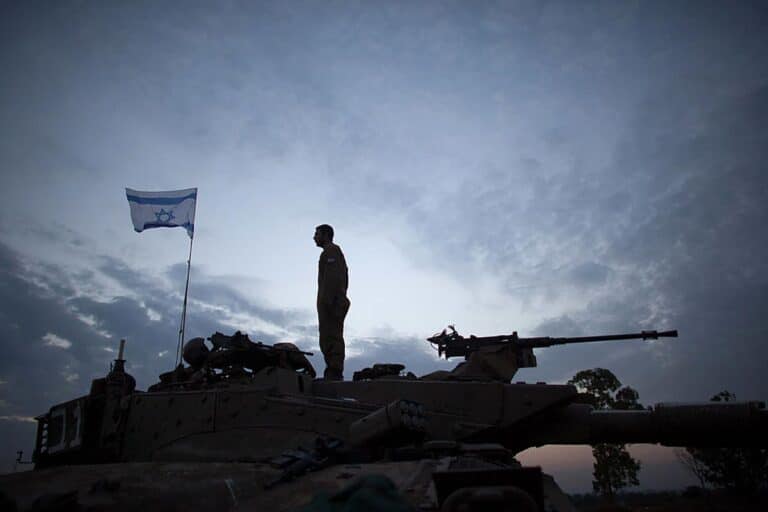
Max Bernstein, who served on the front lines in the 2014 Gaza War, shares tips for soldiers who are currently engaged in combat. It’s crucial that this information reaches those on the battlefield, so please share with any soldiers you might know in active combat roles. To read these tips in Hebrew, click here.
Personal:
- Survival gear is more important than combat gear. Water > bullets, for example. Take enough ammo for your magazines that you carry and a few reloads. Socks are more important than underwear. Rely on experienced veterans that you’re with, and follow their advice.
- Don’t underestimate the importance of hearing protection and helmets. Keep earplugs in at least your non-dominant ear, and have them tied to strings on your helmet so they’re always accessible (I used to poke a hole through them with a knife and thread a bit of thin string through so they wouldn’t come loose). Helmet should be worn as much as possible, even when resting/sleeping. Sucks, but it’s the #1 lifesaver, especially in the dark where you can easily be stepped on, trampled, trip and hit your head, etc.
- Get your hands on rehydration or Gatorade powder packs if you can, and ration them (1 per day). Carbs are more important than protein, halva is a great source of both.
- Don’t expect to sleep. Focus on resting your body and laying still when you’re not moving and in a secure location.
- Keep it small and focus on what’s in front of you. Push thoughts of family, friends, and other soldiers in different units out of your mind. You need to focus on what you can control, which is your training, how you react if something happens, and keeping yourself/your squad alive.
- Sanitation is tough to maintain but try your best. Keep trash contained, kill flies when you can, poo/pee outside if possible, and wash your hands with a bit of water before eating. A simple case of diarrhea or vomiting could be life or death in Gaza.
- Stay off social media and don’t post anything that can compromise your unit’s security.
- CLEAN YOUR GUN DAILY. Can’t stress this enough. Take turns covering each other while one person cleans. Doesn’t need to be a deep clean, but at the very least keep the barrel free of dirt and the slide/bolt clean and oiled.
- BRING A DECK OF CARDS. War is 99% boring, even inside Gaza (hopefully).
- HYDRATE EVEN IF YOU’RE NOT THIRSTY.
Squad level:
- Never, ever, EVER split away from your fire team/squad. I assume orders will be to stay in groups of 4 at a minimum, so follow those orders to a T.
- Keep morale up. Don’t complain unless it’s a legitimate concern about logistics etc. It’s okay to crack jokes and have foxhole humor, or to start praying even if you never have a day in your life.
- One of the scariest/most vulnerable moments is going to the bathroom. Don’t be shy to ask for 10 armed men to (literally) watch your backside.
- Don’t overextend yourself or take on too much responsibility. Assuming no one is injured and it’s not an existential emergency, you should all share the load of guarding, preparing defenses, etc., so that no one person becomes exhausted and thus a liability.
Friends and family:
- Keep them posted but stay vague for two reasons: 1) you don’t want to compromise any sensitive security data, and 2) the more they know, the more they’ll worry, which won’t help anyone.
- Having said that, basic touch-points as a “sign-of-life,” even indirectly, are immensely relieving. If you don’t think you’ll be able to get in touch with your family directly, give a contact number to a Mashakit or someone else who can, and ask them to send updates whenever they can.
Bottom line:
You already did the brave thing by putting on your gear, leaving your family and putting yourself in harm’s way to defend your people and country. You don’t have anything to prove, but we do need you to come home alive and in one piece.
Keep it tight, stay sharp, don’t be a hero, and take care of each other. Listen to your commanders and other veterans. Feel free to share this with other soldiers. Good luck boys, stay strong, and when in doubt, DUCK.
P.S. One last personal tip… No matter what happens, this is a unique event in your life. Keep a journal if you can. It will help you move past any trauma you may experience afterwards.
טיפים להישרדות בשטח מלוחם במלחמה בעזה ב2014:
אישי
- ציוד להישרדות חשוב יותר מציוד טקטי. לדוגמא: מים > כדורי רובה. קחו מספיק מחסניות שיהיו לכם גם ספיירים. גרביים חשובים יותר מתחתונים. סמכו על חיילים יותר מנוסים והקשיבו לעצתם.
- אל תמעיטו בערכם של אטמי אוזניים וקסדות. שמרו אטם כל הזמן לפחות באוזן הלא דומיננטי שלכם וחברו אותם לקסדה בעזרת חוט כך שיהיו נגישים תמיד. (אני הייתי חורר בהם חורים עם סכין ומעביר חוט). הימנעו מלהוריד את הקסדה, גם אם אתם נחים או ישנים. מבאס קצת אבל זה טיפ מספר 1 להצלת חיים – במיוחד בחושך כשאנשים אולי ידרכו עליכם \ קל ליפול, לדפוק את הראש במשהו, וכו.
- תנסו להשיג משקאות איזוטוניות \ ג’לים להחזרת נוזלים לגוף ותנסו לשמור לעצמיכים מנה 1 ליום. פחמימות יותר חשובות מחלבונים, חלבה היא מקור מצויינת לשניהם.
- אל תצפו לישון. תתמקדו בלשכב ולנוח כשאתם במקום בטוח ולא בפעולה.
- תתמקדו ברגע ומה שנמצא לפניכם. אל תחשבו על המשפחה, חברים וחיילים בצוותים אחרים. אתם צריכים לחשוב על הדברים שבשליטתיכם שזה האימון שלכם, התגובות לדברים שקוראים ואיך לשמור על החיים שלכם ושל הצוות שלכם.
- קשה לשמור על היגיינה אבל תנסו כמיטב יכולתיכם. שמרו אשפה במקום סגור, תהרגו זבובים כשמתאשר, תעשו את הצרכים בחוץ אם אפשר ושטפו את הידיים עם קצת מים לפני אכילה. מקרים פשוטים של שלשול או הקאה יכולים להיות ההבדל בין חיים ומוות בעזה.
- הימנעו ממדיה חברתית ועל תעלו פוסטים שיוכלו לסכן את בטיחות הצוות שלכם.
- תנקו את הרובים שלכם כל יום. זה מאוד מאוד חשוב. קחו תורות לשמור אחד על השני כשמישהו מנקה את הרובה שלו. זה לא צריך להיות ניקוי יסודי אבל לפחות תסלקו לכלוך מהקנה ותנקו ותשמנו את הבריח.
- תביאו קלפים. מלחמות הם 99% שיעמום, אפילו בתוך עזה (בתקווה).
- תשתו מים גם אם אתם לא צמאים.
צוות
- בחיים אל תיפרדו או תתרחקו מהצוות שלכם. אני מניח שיהיו פקודות להישאר בקבוצות והקשיבו להם.
- שמרו על אופטימיות בצוות. אל תתלוננו אלא אם כן זו תלונה ליגיטימית הקשורה לעניינים לוגוסטים וכו’. זה בסדר להתבדח והשתמש בהומור שחור וזה גם בסדר להתפלל גם אם בחיים לא התפללתם.
- אחד מהרגעים הכי מפחידים \ מלחיצים שלכם הולך להיות השירותים. אל תתביישו לבקש מ10 לוחמים חמושים לשמור לכם על התחת.
- אל תשחקו את עצמיכם ואל תקחו יותר מידי אחריות. בהנחה שאף אחד לא פגוע ואין מצב חירום קיומי, צריך לחלק את המשימות שלכם (שמירה, התכוננות להגנה וכו’) בצורה שאף אחד לא נשחק יותר מידי.
חברים ומשפחה
- תמשיכו לעדכן אותם אבל אל תביאו פרטים משתי סיבות:- אתם לא רוצים להעביר מידע רגיש בצורה לא בטוחה.- ככל שהם יודעים יותר, הם ידאגו יותר וזה לא יעזור לאף אחד.
- למרות זאת, זה מאוד מרגיע אם הם ימשיכו לקבל “סימני חיים”. אם אתם לא חושבים שתצליחו לדבר עם המשפחה שלכם באופן ישיר, תנו מספר של איש קשר למשקית או מישהו אחר שיוכל ותבקשו מהם לשלוח עדכונים כשיתאפשר.
השורה התחתונה
כבר הייתם אמיצים – עזבתם את המשפחה, התייצבתם ושמתם את עצמיכם בסכנה למען העם והמדינה. אין לכם שום דבר להוכיח עכשיו ואנחנו כן צריכים שתחזרו בחיים ושלמים. הישארו ערניים, שמרו אחד על השני ואל תנסו להיות גיבורים. הקשיבו למפקדים ולחיילים היותר מנוסים.
הרגישו חופשיים לשתף את זה עם עוד חיילים.
בהצלחה ותהיו חזקים!
נ.ב. טיפ אחרון אישי – לא משנה מה יקרה, זו חוויה ייחודית. תנסו לשמור יומן. הוא גם יוכל לעזור לכם להתמודד עם רגשות של טראומה בעתיד.
Originally Published Oct 11, 2023 02:44PM EDT
